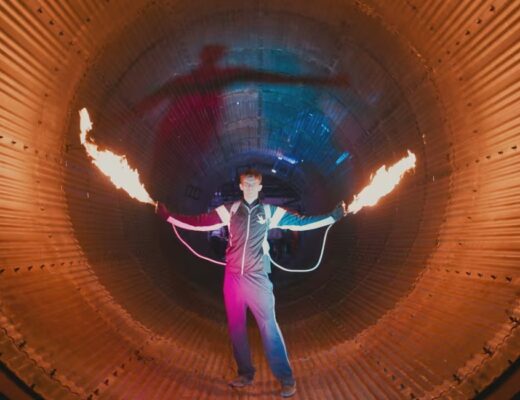The myth of Orpheus seems to tell us that in the face of overwhelming grief, the hardest thing to do is have faith that things will get better. Grief-stricken after the death of his wife, he seeks out Hades himself and is told: Eurydice will return to you, but you must trust me. Don’t look back. And Orpheus, struck by the beauty of the sun as they walk out of the Underworld together, turns to share the moment with his beloved wife, and she disappears. Queena Li adapts this myth for her debut feature, Bipolar, the story of a young Chinese woman (Leah Dou) who embarks on a road trip through Tibet with a lobster in the passenger seat.
Water is frequently evoked as the mostly linear narrative cuts away to scenes of swimming pools, bathtubs, fishing nets, and the rippling surface of a lake or ocean. In Li’s hands, water represents both the unconscious mind and the trauma submerged beneath the tide. She steadily builds on these seemingly disjointed ideas, eventually showing the unnamed woman with a man who looks uncannily similar. Depictions of suicide and depression start to appear, although motives and explanations remain opaque. Are they in an abusive or codependent romantic relationship? Are they siblings, perhaps twins? Or maybe these figures represent two sides of the same person and audiences are meant to interpret the film’s title literally. We’re also shown flashbacks of her life as a successful singer and performer (incidentally, Leah Dou is the daughter of musicians Dou Wei and Chungking Express’s Faye Wong), where the woman is an angry, charismatic presence alone on a cavernous stage.
The lobster is initially portrayed as a quasi-mystical being, colored in rainbow stripes and submerged in a tank alongside pearl and crystal necklaces. The image is a fitting metaphor for the commodification of Tibet in general, where industrialization blights the landscape and lavish hotels cater to tour groups of “pilgrims.” But over the course of the film, the lobster’s paint wears off and the narrator sees it for what it is: an ordinary crustacean with an impenetrable exoskeleton and a questionable ability to feel pain. Ostensibly, the young woman is returning the lobster to its rightful home at Ming Lake Lighthouse, and the entire film is about this odyssey – not quite the pilgrimage people usually come to Tibet to undertake, but a spiritual journey nonetheless. But when she finally gets there, she’s told the lighthouse doesn’t exist. It’s a made-up tourist trap, and the only local who believes it is considered mad.
The idea of home comes up frequently: the narrator is assumed to be a runaway, while an adolescent monk tells her, “Home is like a hotel. You check in, then you check out.” In another sequence, the road trip is interrupted when the narrator and her friend sneak into a zoo where the animals sit in bleak metal cages — it’s a noble gesture, even if it didn’t actually happen. Throughout the film, dreams and memories commingle with disconcerting ease and symbols abound, or at least appear to. At times, though, Bipolar’s dependence on amorphous visuals and dream logic threatens to capsize the already slight plot; and with so little to hold onto, viewers may feel just as adrift as the anonymous narrator.
Published as part of IFFR 2021 — Dispatch 3.







